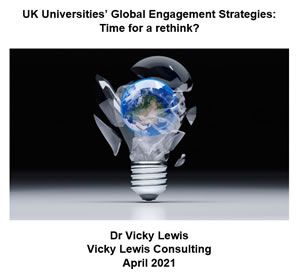International Strategy for Higher Education Institutions
International Strategy for Higher Education Institutions

Posted on by Vicky Lewis

In my last blog, I provided an overview of how my new report – UK Universities’ Global Engagement Strategies: Time for a rethink? – came to be; and outlined the sections and chapters included within it.
Part One of the report includes a chapter (Chapter 2) entitled ‘The pandemic as a catalyst for reprioritisation’, which argues that the structural break represented by Covid-19 makes now the right time to reconsider our strategies for internationalisation and global engagement.
This blog dips into some of the points raised in Chapter 2.
The pandemic has sharpened our collective focus on a number of areas touching on global engagement that were already emerging as prominent themes within HE sector discourse: from the climate emergency and sustainable development to the meaning of ‘Global Britain’ and our future relationship with Europe; from the need to address ingrained and systemically reinforced inequalities to the fourth industrial revolution and the potential of digital technologies to make higher education more accessible.
The pandemic has shone a spotlight on the societal role of universities and their responsibility to contribute to the global common good. At the same time, it has wrought havoc with university finances. The challenge of planning for a very different future while simultaneously keeping an institution afloat during a crisis has been immense.
For Simon Marginson (Professor of Higher Education at University of Oxford), the pandemic clearly illustrates the need to put the common good ahead of other considerations. Others have emphasised the importance of international collaboration and urged universities to move on from competition and an obsession with rankings to focus on solidarity and connectedness.
An ethical approach to internationalisation is seen by some as imperative: the western model of internationalisation is regarded as unsustainable and those who work within it are challenged to reverse its adverse effects. The concept of ‘Internationalisation in higher education for society’ has taken hold, with social impact and the UN’s Sustainable Development Goals high on the global HE agenda.
Increasingly, academic and practitioner debates highlight the limitations of the mainstream global rankings, which are seen as having failed to evolve since they were devised (early 2000s), paying little attention to factors such as social contribution, teaching quality, diversity and inclusion, or accessibility.
It is suggested that continuing to define ‘success’ based on a skewed set of metrics risks institutions focusing on what their peer group prioritises, instead of defining their own, distinctive contribution.
Institutional strategies are produced in a specific national context, reflecting government priorities.
Within the UK, one crucial lever to help achieve international student enrolment growth was the welcome announcement in late 2019 of a new Graduate Immigration Route, opening up post-study work rights for graduates of UK HEIs. In the final days of 2020, the sector heaved a sigh of relief at the news that the UK would participate as an associate country in the European Union’s research and innovation programme, Horizon Europe.
However, there have been disappointments too. The country’s withdrawal from the student and staff exchange programme, Erasmus+ and, more recently, drastic government cuts to Official Development Assistance (ODA)-funded research, which are expected by many to undermine UK universities’ role in addressing global challenges and to damage long-standing partnerships.
The February 2021 update to the UK Government’s International Education Strategy (IES) was broadly welcomed by the sector for its aspirations to diversify student recruitment markets, expand transnational education opportunities, enhance the international student experience and graduate employability, and support – via the new Turing scheme – the outbound mobility of disadvantaged students. However, it remains undeniably an education export strategy, with an underlying philosophy of building the UK’s global profile, reach and – as highlighted in the chosen KPIs – export earnings. It does not address other aspects of UK universities’ global engagement priorities.
The tensions at institutional level are challenging. There is an opportunity to rethink strategies that may previously have been built around traditional (profile-building) measures of success, and to consider how the institution can contribute sustainably to the common good of the communities with which it engages. However, to be viable, any such shift in emphasis needs to be firmly grounded in the realities of the early 2020s, when a global economic crisis is taking hold, institutional finances are depleted and staff capacity to embrace further major change initiatives are compromised.
Difficult choices must be made (including choices to stop doing certain things). Careful thought needs to be given to the phasing of changes and the right balance needs to be achieved between long-term vision and short-term pragmatism.
The full Global Strategies report can be downloaded from Global Strategies Report – April 2021.
That page also includes download buttons for the Executive Summary and for an Overview of key questions for HEIs to ask, as leaders develop, review and consult on strategy.
GLOBAL STRATEGIES REPORT INTERNATIONALISATION GLOBAL ENGAGEMENT GLOBAL COMMON GOOD SOCIAL IMPACT UK NATIONAL PRIORITIES
|
|